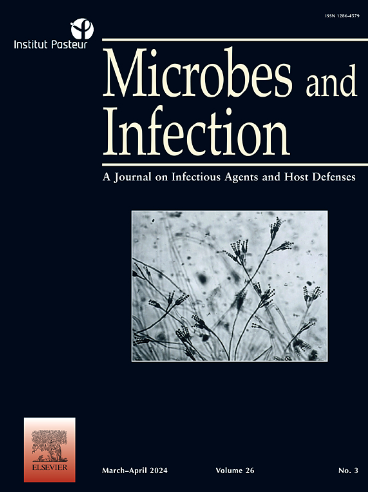CD4, but not Cxcr6, is necessary for control of Pneumocystis murina infection
IF 2.7
4区 医学
Q3 IMMUNOLOGY
引用次数: 0
Abstract
CD4+ T cells are critical to control of Pneumocystis infection, and Cxcr6 has been shown to be upregulated in these cells during infection, but the roles of CD4 and Cxcr6 in this setting are undefined. To explore this, mice deficient in CD4 or Cxcr6 expression were utilized in a co-housing mouse model that mimics the natural route of Pneumocystis infection. Organism load and anti-Pneumocystis antibodies were assayed over time, and immunohistochemistry, flow cytometry, and quantitative PCR were used to characterize host immune responses during infection. CD4 was found to be necessary for clearance of Pneumocystis murina, though partial control was seen in it's absence; based on ThPOK expression, double negative T cells with T helper cell characteristics may be contributing to this control. Using a Cxcr6 deficient mouse expressing gfp, control of infection in the absence of Cxcr6 was similar to that in heterozygous control mice. It is noteworthy that gfp + cells were seen in the lungs with similar frequencies between the 2 strains. Interferon-ɣ and chemokine/ligands Cxcr3, Cxcl9, and Cxcl10 increased during P. murina infection in all models. Thus, CD4, but not Cxcr6, is needed for clearance of P. murina infection.
CD4而非 Cxcr6 是控制鼠肺孢子菌感染的必要条件
CD4+ T 细胞对控制肺孢子虫感染至关重要,而 Cxcr6 已被证明在感染期间在这些细胞中上调,但 CD4 和 Cxcr6 在这种情况下的作用尚未明确。为了探究这一问题,我们在一个模拟肺孢子虫自然感染途径的共居小鼠模型中利用了缺乏 CD4 或 Cxcr6 表达的小鼠。随着时间的推移,对病原体载量和抗肺孢子虫抗体进行检测,并使用免疫组化、流式细胞术和定量 PCR 分析感染期间宿主免疫反应的特征。研究发现,CD4 是清除 P. murina 的必要条件,但在 CD4 缺失的情况下也能看到部分控制;根据 ThPOK 的表达,具有 T 辅助细胞特征的双阴性 T 细胞可能有助于这种控制。使用表达 gfp 的 Cxcr6 缺陷小鼠,在没有 Cxcr6 的情况下,感染控制与杂合对照小鼠相似。值得注意的是,两种品系的小鼠肺部出现 gfp+ 细胞的频率相似。在所有模型中,干扰素ɣ和趋化因子/配体 Cxcr3、Cxcl9 和 Cxcl10 在鼠疫感染期间都有所增加。因此,清除鼠疫感染需要 CD4,而不是 Cxcr6。
本文章由计算机程序翻译,如有差异,请以英文原文为准。
求助全文
约1分钟内获得全文
求助全文
来源期刊

Microbes and Infection
医学-病毒学
CiteScore
12.60
自引率
1.70%
发文量
90
审稿时长
40 days
期刊介绍:
Microbes and Infection publishes 10 peer-reviewed issues per year in all fields of infection and immunity, covering the different levels of host-microbe interactions, and in particular:
the molecular biology and cell biology of the crosstalk between hosts (human and model organisms) and microbes (viruses, bacteria, parasites and fungi), including molecular virulence and evasion mechanisms.
the immune response to infection, including pathogenesis and host susceptibility.
emerging human infectious diseases.
systems immunology.
molecular epidemiology/genetics of host pathogen interactions.
microbiota and host "interactions".
vaccine development, including novel strategies and adjuvants.
Clinical studies, accounts of clinical trials and biomarker studies in infectious diseases are within the scope of the journal.
Microbes and Infection publishes articles on human pathogens or pathogens of model systems. However, articles on other microbes can be published if they contribute to our understanding of basic mechanisms of host-pathogen interactions. Purely descriptive and preliminary studies are discouraged.
 求助内容:
求助内容: 应助结果提醒方式:
应助结果提醒方式:


